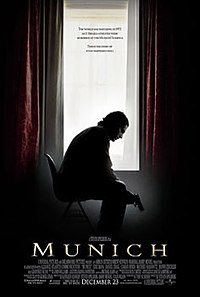 This will need to be brief because I actually have too much to say. Back in 2005, Steven Spielberg, King of the Jews (with all that title entails) decided that his years in higher education (baccalaureate from film school, which, admittedly, is better than Clown College), gives him the authority, nay, the responsibility to comment on the Arab-Israeli conflict.
This will need to be brief because I actually have too much to say. Back in 2005, Steven Spielberg, King of the Jews (with all that title entails) decided that his years in higher education (baccalaureate from film school, which, admittedly, is better than Clown College), gives him the authority, nay, the responsibility to comment on the Arab-Israeli conflict. We know from the fact that he is (1) rich, (2) not-religious, and (3) married a bunch of non-Jewish women, we shouldn't expect that a movie about Israel will not be favorable to the Jewy Jewish State for Jews. And we'd be right.
Munich (2005) is based on a fictional account, written as non-fiction, of the aftermath to the massacre of Israeli athletes at the 1972 Munich Olympics. But because the book source wasn't false enough, Spielberg needed to fake it up with a whole bunch of stuff that insults the memories of the victims of the tragedy, insults Israel, and all in the service of making a simple grade-school morality point: there's no such thing as good violence.
Well, I didn't have the time to waste watching the film before talking about it from the pulpit. Rather, I adhered to the "Silence of the Jesus Lambs" Rules which state that you don't have to sit through a movie if more than 90% of eyewitnesses, including many you trust from other encounters but including ordinary neutral parties, all agree. People from all walks agreed that The Passion was a blood-orgy of anti-Semitic hate. And even though Mel Gibson was a known tee-totaling philo-Semitic philanthropist, the eyewitnesses spoke as one.
So too with Silence of the Munich. Many trustworthy sources said that it was mean, stupid, hokum. And so I based my sermons on their words, including this fine analysis by Rabbi Benjamin Blech.
The key point of Rabbi Blech is that Spielberg uniformly distorted events, and then just made stuff up, in order to broadcast a dishonest agenda:
Too bad the movie does not include perhaps the single most relevant dialogue in Jonas' book, Vengeance, that served as the primary source for Munich. In assigning the mission, the agents are given clear instructions: If you get all of the names on the list, your mission is an incredible success. Get six or five, we will feel the message has been sent that Jewish blood is not cheap, that we will not sit idly by as the world did during the Holocaust. Even if you get only one or two, it will not have been in vain. But if you will be faced with a choice between killing any one on the list together with an innocent bystander or aborting your mission, your instructions are to do nothing.Part 2 of this topic will deal with my reaction to actually seeing the movie.
That piece of information is probably the most crucial difference between the Munich terrorists and the Israeli hit-squad, yet it wasn't included in the film.
Munich concludes with a final insult: The disillusioned leader of the mission, who cannot abide the ideology of a country that dares to declare that it will no longer idolize the glorification of the Jew as victim, renounces his country and settles in Brooklyn. And so ends the hope of the Jewish people.
It never happened. And it makes whatever message Spielberg sought to bring to the screen indefensible.
P.S. I do like the fact that after insulting the memories of the victims of the Olympic massacre, Spielberg becomes part of the Beijing Olympics committee. His moral compass was shattered, and who knows when. And, yeah, he pulled out of the committee a few months ago in protest over the Chinese complicity of the genocide in Darfur. Bra-effing-O Steve. You're a real hero.
Backpost finished 4/13/08, 9:11 PM. I had just the link to Blech's article.
